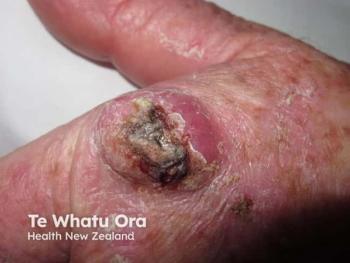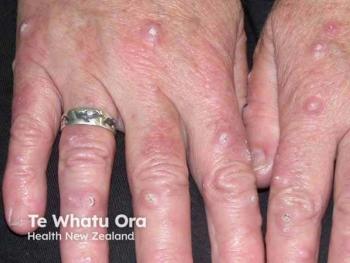
Patient Age Impacts Satisfaction with Physician-Provided Melanoma Information
Providing thorough, clear and actionable information is a key part of melanoma care; survey offers a look at where dermatologists can improve.
How much do patients with melanoma feel like their physicians inform them about the disease and related tests, treatments, and self-help options? It may depend on their age. Whereas middle-aged patientsappear most satisfied with melanoma information provided by their doctors, elderly patients report the least satisfaction, according to a survey of Swedish patients published in BMC Cancer.
Investigators sent a cross-sectional survey covering qualityoflife, information, and symptoms to 1213 patients diagnosed with melanoma during 2013-2014. Among 792 respondents,key findings were as follows:
- Patients over age 70 reported receiving less information, and were less satisfied with that information, than younger patients.
- Patients between ages 18 and 39 were most likely to want more information.
- Patients between 40 and 69 years old were most satisfied with the information they received compared to younger and older patients.
- The perception of having received enough information correlated positively with functional and quality-of-life scores, and negatively with levels of anxiety and depression.
“The findings in this study are not all that surprising,” said Patricia K. Farris, MD. “Melanoma patients have lots of questions and understandably anxiety about their diagnosis. Giving them more information gives them more peace of mind.” A clinical associate professor of dermatology at Tulane University and a private practitioner at Old Metairie Dermatology, Metairie, La, she was not involved with the survey.
The survey’s key message, according to lead author Helena Tufvesson Stiller, is that providers must tailor information given to patients based on factors such as their age and capabilities. She is a PhD student in the Department of Clinical Health and Public Medicine, Dermatology, at Umea University in Umea, Sweden.
The best way to personalize patient information remains an area for future investigation, she added. But based on the present study, Tufvesson Stiller suggested that dermatologistsconsider the knowledge gap between them and their patients.
“As a doctor,” she explained, “saying that the melanoma on your arm was small, removed, and needs no further treatment may seem like clear information. A patient, however, may have problems fitting that into what they know about cancer and cancer treatment. Further information about follow-up, signs to look for, and prognosis could be helpful in that case.” So could dialogue regarding reliable information sources, she added.
Farris said, “The information we give melanoma patients is individualized but is based on the type and staging of the melanoma. The take-home for me is that we can really make a difference in quality of life for our melanoma patients by making sure they are fully informed.”
Reference:
Tufvesson Stiller H, Mikiver R, Uppugunduri S, Schmitt-Egenolf M. Perception of information to Swedish melanoma patients in routine clinical practice—a cross-sectional survey. BMC Cancer. 2022;22(1):159. Published 2022 Feb 9. doi:10.1186/s12885-022-09208-w
Disclosure:
Tufvesson Stiller and Farris report no relevant financial interests.
Newsletter
Like what you’re reading? Subscribe to Dermatology Times for weekly updates on therapies, innovations, and real-world practice tips.











